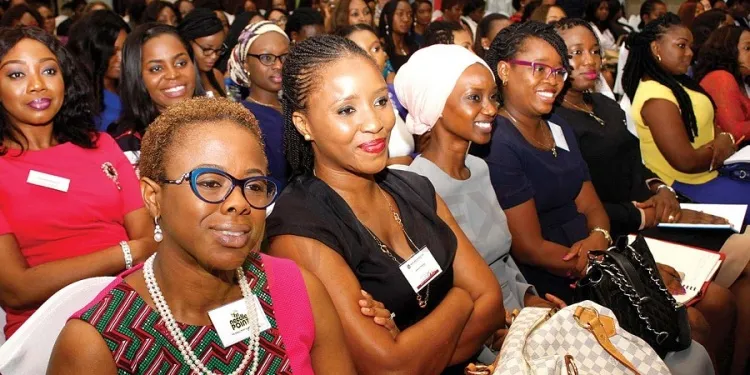简体中文
繁體中文
English
Pусский
日本語
ภาษาไทย
Tiếng Việt
Bahasa Indonesia
Español
हिन्दी
Filippiiniläinen
Français
Deutsch
Português
Türkçe
한국어
العربية
Why Nigerian women can be better at investing
Abstract:The growth of women’s financial power in Nigeria’s capital market is nothing but admirable. As more and more women take advantage of their financial power, they are taking on personal finance basics.
The growth of women‘s financial power in Nigeria’s capital market is nothing but admirable. As more and more women take advantage of their financial power, they are taking on personal finance basics.

Recall that MTN Nigeria reported during its initial offer many months ago that 85% of successful candidates were under the age of 40 and that women made up about 76% of those who were accepted.
Though women may have less money to invest and develop their wealth over time, they eventually fall short of their financial goals due to factors like salary disparity, career breaks, work flexibility, longer life expectancy, and attitude toward risk.
A recent study on how gender affects access to credit services highlights that 98% of Nigerian women are excluded from the formal credit markets.
This is partially due to the fact that formal financial inclusion is still low in Nigeria: only approximately 3% of adult Nigerians have taken out loans from formal sources, and less than half (45%) have formal accounts at either banks or microfinance organizations (EFInA Access to Finance Survey 2020).
The good news is that women tend to be more disciplined investors than men, and if they were to invest with the right approach, it might be possible for them to close the gender gap and achieve their goals.
We are all aware of the need of having an emergency fund with enough cash on hand to cover at least three months worth of living expenses, whether the unexpected comes in the shape of a job loss, an expensive auto repair, a medical emergency, or a pandemic over the world.
Due to the gender pay difference or because they took time off from their employment to care for loved ones or for children, women are more frequently at risk of pension poverty since they have less money saved up than men. To ensure a better future, it is crucial that people make their money work harder for them.
When should women make investments?
The earliest opportunity to invest your money is the best moment to do it. As a result, starting early in your employment, investment should be a part of your financial strategy. This will provide you with a sizable window of time to watch your money grow.
Additionally, it will give you adequate time to recover from any losses brought on by underperforming assets. Having said that, depending on your personal objectives, you can choose from a variety of long- and short-term investing possibilities.
Retirement planning
It is very hard to save for retirement without investing unless one starts off with a huge salary and can set aside more than half of their take-home pay. It might be challenging to maintain a decent living on savings alone due to rising medical expenditures, rising higher education costs, exorbitantly expensive goods, and other expenses.
To combat inflation, you must have an investment strategy that can increase your money over time and provide significant returns. A sizeable retirement fund can help you live comfortably in your golden years while also providing for things like family needs, unexpected medical expenses, and much more.
An average Nigerian woman has better mental fortitude because she naturally wears many hats of obligations, including those of wife, mother, daughter, sister, and working woman. As a result, they are conscious of their job and work to fulfill it regardless of the tragedy. They possess all the qualities necessary to be a successful trader or investor and are a lifelong optimist.
According to reports from the World Bank, there is still more to be done. Because they lack education and access to higher-paid employment in the labour sector, many Nigerian women turn to entrepreneurship. Access to the official banking system is necessary for women in Nigeria to break the cycle of irregular income.
Additionally, Statista data revealed that an estimated 88.4 million Nigerians are living in extreme poverty in 2022. Around 44.7 million men and 43.7 million women in the nation were estimated to be subsisting on less than $1.90 USD per day.
That being said, UNICEF recent studies raising the alarm that 10 million Nigerian girls were not in schools is far from encouraging, thus sending signals to the continents greatest economy on taking education more seriously.
Disclaimer:
The views in this article only represent the author's personal views, and do not constitute investment advice on this platform. This platform does not guarantee the accuracy, completeness and timeliness of the information in the article, and will not be liable for any loss caused by the use of or reliance on the information in the article.
WikiFX Broker
Latest News
Exposing the Top 5 Scam Brokers of March 2025: A Closer Look by WikiFX
Gold Prices Climb Again – Have Investors Seized the Opportunity?
Webull Launches SMSF Investment Platform with Zero Fees
Australian Regulator Warns of Money Laundering and Fraud Risks in Crypto ATMs
The Withdrawal Trap: How Scam Brokers Lure Victims into Paying More
FCA to Investors: Think Twice Before Trusting These Brokers
Trump\s tariffs: How could they affect the UK and your money
Trump gambles it all on global tariffs he\s wanted for decades
TradingView Brings Live Market Charts to Telegram Users with New Mini App
HTFX Spreads Joy During Eid Charity Event in Jakarta
Currency Calculator







